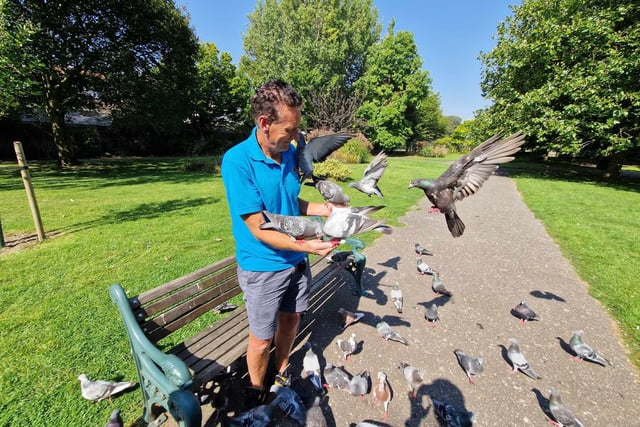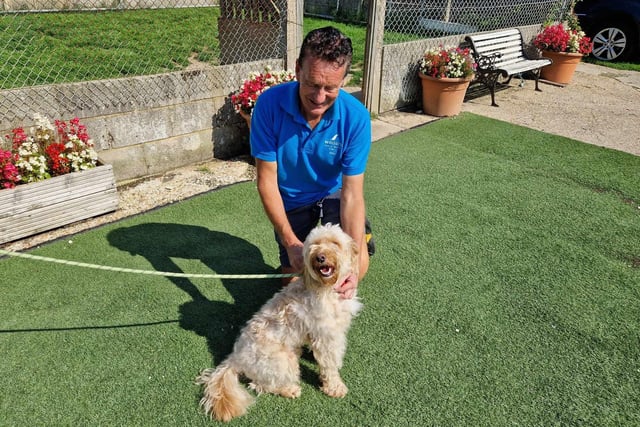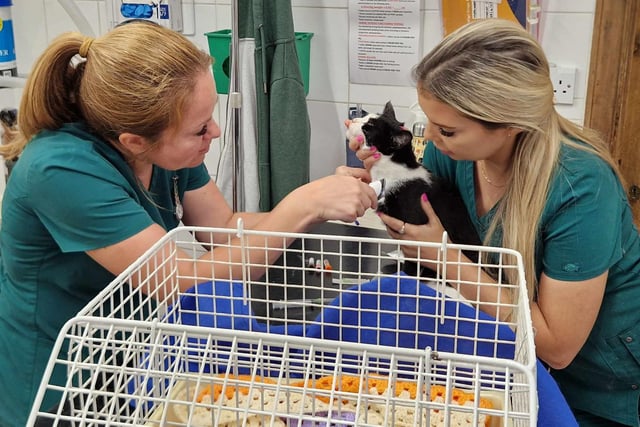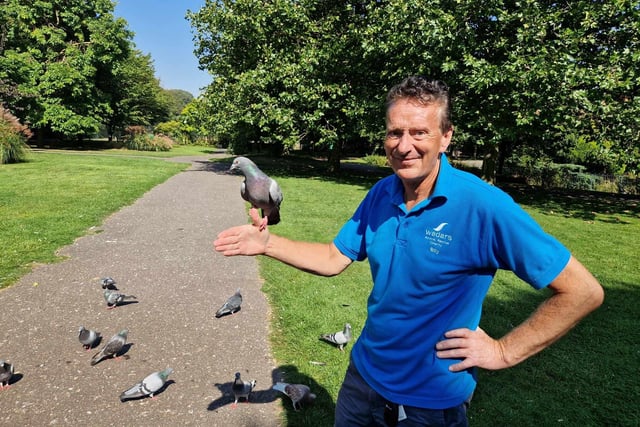Wadars, which has operated in the Worthing area for more than 50 years, rescues and rehabilitates wild animals, in addition to rehoming cats, dogs and small animals as pets.
Based in Ferring, the charity cares for thousands of injured or orphaned animals found in the local area every year.
Animal rescuer officer Billy Elliot, who has been in the role for 25 years, explained why the charity is unique.
“We deal with all animals,” he said. “We take in unwanted cats and dogs, rabbits, guinea pigs and all furries that people are no longer able to keep and care for.
"We also run an ambulance service where we can rescue sick or injured wild animals and birds and take them to a place of safety as well. We were established in 1969 and our ambition has always been to having our own rehoming centre and wildlife rehabilitation centre.
"We are now closer to achieving our dream than ever. Obviously this incurs extra costs as development of the site is taking place.
"Being an animal charity, unfortunately we don't qualify for grants from the government or national lottery. All our funding is by way of funding legacies and generosity of the public.
“It is purely the public’s goodwill that we rely on. The majority of our funding comes from people who remember us in their will. We are always grateful but, in some respects, it’s sad because it’s too late to say thank you.
"I’d like to think that it’s an appreciation of something we’ve done for them in the past. They believe in the work we are trying to do.”
Billy, a full-time animal rescuer officer, is supported by two part-time members of staff. The work force will be expanded when the exciting development process is completed.
“Theoretically we cover a ten-mile radius but it’s very difficult, if somebody is in a desperate situation 12 or 15 miles away,” Billy said. “It’s hard to turn your back on them.
"We will go out to any animal. Brent Lodge [Wildlife Hospital in Sidlesham] will take any of them in but can’t provide ambulance service that we are able to. That’s what makes us unique.
"We're not in the job to put animals to sleep if there's nowhere for them. We can only do our best.
“People appreciate us because we do get out there and pick things up. We don't complain how busy we are.
"We are a small local charity so can offer a personalised service. I like to think we can be flexible. We take each case as an individual as people and animals are different. We can go and see them before making a decision about rehoming. We can say a dog isn’t suitable for you but we will find one that is.”
Day in the life on animal rescue officer
Billy was speaking to Sussex World reporter Sam Morton, who was invited to shadow the experienced and passionate animal rescue officer as he went about his daily business last Thursday (September 7).
The day got off to a quick start when Billy received a call to rescue a fox at a home in Goring-by-Sea. The omnivorous mammal had become trapped between a fence and a shed.
Billy explained: “It’s a fairly common thing. Foxes are around at night and look for place to hide up for the day. If they get disturbed – normally it’s when they’re chased by a dog – it will bolt to get away. Quite often they’ll run down between two walls to get out.”
Upon arrival at the home, the fox was no where to be seen – seemingly having freed itself. This wasn’t ideal, Billy said, as the wild animal could have been in need of medical attention which it would have been able to receive if taken into the hands of the rescue officer.
Billy said: “There a lot of foxes at this of year as it’s seasonal. Between the end of May and August, seagulls are the most common wildlife we pick up. Pigeons are out all year round. Most birds only nest in spring and summer.
“In winter, when the sea is rough, we get more sea birds with oil on them.”
The next job was to take a cat, named Milly, to Fitzalan House Veterinary Surgery in Littlehampton. The feline had recently given birth to kittens.
“When they’ve had a litter, they are susceptible to becoming pregnant again straight away,” Billy said. “There are some not particularly pleasant cat diseases so we have our cats vaccinated.
“Milly is going to be scanned to make sure she doesn’t have kittens inside. They will be blood testing her for feline aids or leukaemia viruses to check she’s not a carrier.
“Female cats from six months of age can have kittens themselves. In a five-year period, one six-month old female kitten can be responsible for 20,000 more cats.
"The other incredible thing about cats is they will call when they’re ready to mate. At the still of night, when traffic noise has calmed down and it’s quiet, cats have been recorded as hearing each other up to distances of six miles away. Attracts every male cat in that radius. They will turn up and generally fight."
As a dog lover, a highlight of the day was the opportunity to meet two-year-old Coco – a Cockapoo affected by the cost of living crisis.
Coco had to be rehomed due to his owner no longer being able to afford to look after him
“He not been mistreated or abused,” Billy stressed. “But he is in a bit of a state at the moment.
"Poodles don’t malt but hair grows and grows and they need to have a groomer. It can be £40 now days each six weeks for poodles.
“He hasn’t had vaccinations done. He wasn’t being walked either as they were scared he’d catch something. They normally live for their walks.
“We will get him groomed and vaccinated and give him a bit of training before it’s ready to go out. Someone is going to get a very nice dog but they are going to have to put a bit of extra work in during first six months.
"Dogs need a routine – they are a lot calmer and more content. I can build relationships with the dogs on walks and reassure them before they go to the vets.”
With not many emergency calls coming in, it presented an opportunity to visit the pigeon memorial at Beach House Park.
Billy said he often treats ‘weak and dehydrated’ pigeons before taking them to the park in Worthing – where they are regularly fed by the public.
Billy explained that pigeons have unfairly become unpopular in recent years – despite being extremely intelligent and playing a vital role during the war.
“We get phone calls of people saying they’ve got an injured bird in the garden but not sure if you want to help because ‘it’s just a pigeon’,” Billy said. “It shows you how attitudes change.
“A lot of people look at them with disdain but our relationship with pigeons dates back over 10,000 years. They were probably used for food by Neolithic men but, 2,500 years ago, we cottoned on they could be used for commutation. That opened up new trade.
"As many as 100,000 pigeons lost their lives in First World War. The PDSA (People's Dispensary for Sick Animals) brought out an honour for animals equivalent to Victoria Cross. It was awarded to dogs, pigeons, cats and horses. Before we had telephones or radio communication, pigeons were really valuable.”
Tragedy struck in July when the animal rescue centre had to put down all of the birds in its care after an avian influenza outbreak. A strain of avian influenza had been found in a group of captive birds in West Sussex.
The centre remains under quarantine for three months and still cannot take in new wildlife. Defra (Department for Environment Food and Rural Affairs) will send people to complete ‘a deep clean’ at the centre.
Billy said: “Baby gulls had to be put to sleep humanely. We don’t want to have to witness that again. It was a heartbreaker.”
Wadars has launched an emergency appeal following the outbreak – which resulted in clean-up costs in the region of £25,000.
If you would like to support the charity financially, you can download a donation form here.
Billy added: "If there's ever anything we can do to help an animal in distress or an injured animal to take it to a place of safety, we are always contactable on 01903 247111.”

1. A day in the life of an animal rescue officer
Billy said he often treats ‘weak and dehydrated’ pigeons before taking them to Beach House Park in Worthing – where they are regularly fed by the public Photo: Sam Morton

2. A day in the life of an animal rescue officer
Billy with Coco the Cockapoo who has been affected by the cost of living crisis and had to be rehomed Photo: Sam Morton

3. A day in the life of an animal rescue officer
A cat, named Milly, was taken by Billy to Fitzalan House Veterinary Surgery in Littlehampton. The feline, pictured with Leigh Sayer and Kate Pescott, had recently given birth to kittens Photo: Sam Morton

4. A day in the life of an animal rescue officer
Based in Ferring, the charity cares for thousands of injured or orphaned animals found in the local area every year Photo: Sam Morton